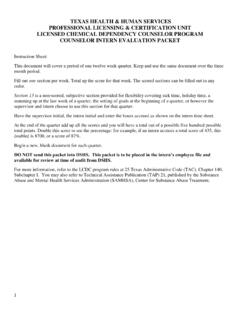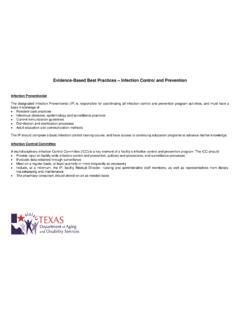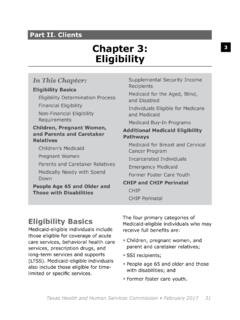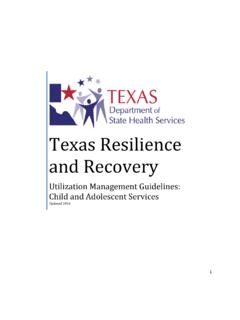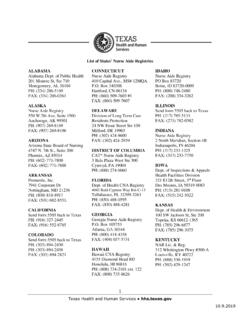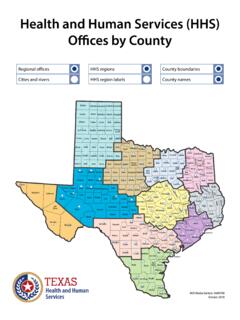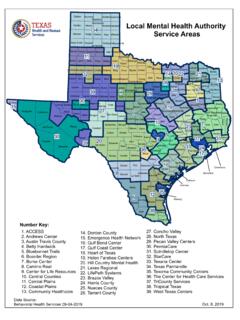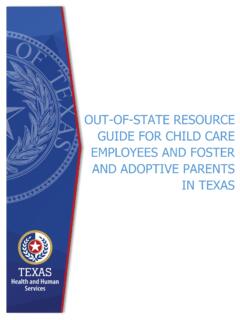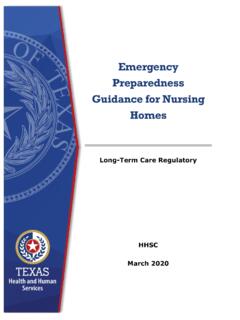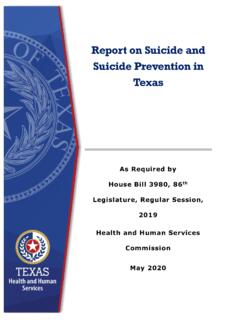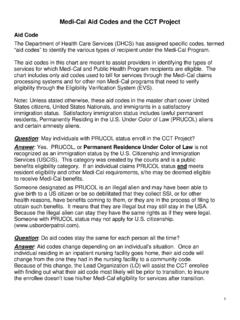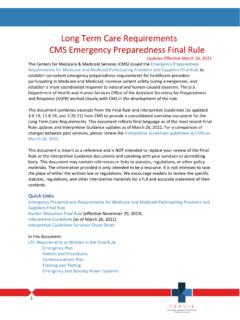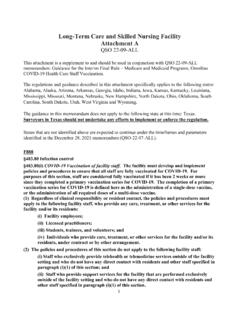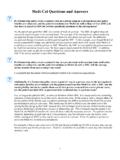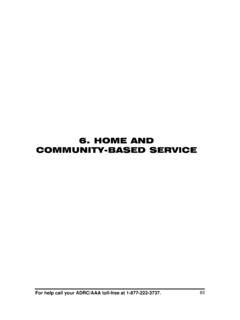Transcription of Long-Term Care Regulatory Provider Letter
1 Box 13247 Austin, Texas 78711-3247 512-424-6500 Long-Term care Regulatory Provider Letter Number: PL 21-43 (revised) Title: Updates to Nursing Facility Rules Provider Types: Nursing Facility (NF) Date Issued: December 21, 2021 Subject and Purpose This Letter provides guidance related to newly amended rules in 26 Texas Administrative Code (TAC) Chapter 554, which become effective January 2, 2022. The newly amended rules implement House Bill 1848 and House Bill (HB) 2050 passed during the 86th Texas Legislative Session, 2019, Regular Session, and include additional requirements related to: consent to antipsychotic or neuroleptic medication (26 TAC ); rapid influenza diagnostic tests (26 TAC (b)(4)); and monitoring of multidrug-resistant organisms (26 TAC (b)(2)(A)).
2 The newly amended rules also amend requirements related to annual in-service training for nurse aides to include infection prevention and control training (26 TAC ). This Provider Letter was updated to reflect the correct effective date of the rules, which is January 2, 2022. Policy Details & Provider Responsibilities Consent to Prescription of Antipsychotic or Neuroleptic Medication For a resident, or a resident s legally authorized representative, to provide consent to the prescription of an antipsychotic or neuroleptic medication, the consent must be documented on a form prescribed by PL 21-43 December 21, 2021 Page 2 of 4 HHSC (consent form), which is Form 37131.
3 The Form 3713, either the original version or a copy, must be added to the resident's clinical record2. All other requirements related to a resident s consent to psychoactive medication still apply to antipsychotic and neuroleptic medication, including: A person may not administer a psychoactive medication to a resident unless the resident, or the resident s legally authorized representative, has consented to the medication, or the resident is having a medication-related emergency; Consent must be given voluntarily and without coercive or undue influence; and The person prescribing the medication, that person s designee, or the NF s medical director provides the required information related to the medication to the resident or the resident s legally authorized representative.
4 Rapid Influenza Diagnostic Tests NFs must include in their infection prevention and control programs procedures for making rapid influenza diagnostic tests available to facility Facilities will have to determine the most appropriate method for ensuring rapid influenza diagnostic tests are available to residents. Facilities will not be required to store rapid influenza tests in the facility if there are other ways to ensure availability, such as partnering with local pharmacies, doctors offices, or laboratories. Facilities must also educate residents on the potential out-of-pocket costs related to rapid influenza diagnostic tests before the resident submits to a test.
5 Monitoring of Multidrug-Resistant Organisms NFs must include in their infection prevention and control programs a system of surveillance designed to identify possible multidrug-resistant organisms4. Multidrug-resistant organisms (MDROs) refer to 1 26 TAC (c)(4) 2 26 TAC (c)(5)(B) 3 26 TAC (b)(4) 4 26 TAC (b)(2)(A) PL 21-43 December 21, 2021 Page 3 of 4 microorganisms, predominantly bacteria, that are resistant to one or more classes of antimicrobial agents. Although the names of certain MDROs describe resistance to only one agent, these pathogens are frequently resistant to most available antimicrobial agents and include multidrug-resistant gram-negative bacteria, Carbapenem-resistant Enterobacteriaceae, and extended spectrum beta-lactamase-producing Enterobacteriaceae5.
6 MDROs are a well-researched issue in healthcare settings and can be very harmful to residents. NFs are already required to have an antibiotic stewardship program that includes antibiotic use protocols and a system to monitor antibiotic use, which is to prevent MDRO outbreaks. The CDC recommends Long-Term care facilities identify experts who can provide consultation related to MDROs as needed. There are several resources related to the prevention and surveillance of MDROs, including: CDC: Multidrug-resistant organisms (MDRO) Management this includes specific guidance for Long-Term care facilities DSHS: Antibiotic Resistance/Multidrug-Resistant Organisms Home this includes links to various resources.
7 Facilities can also send MDRO questions to Annual In-Service Infection Prevention and Control Training HHSC is requiring facilities to provide two-hours of infection control and personal protective equipment training as a part of the 12 hours of in-service training that must be provided to nurse aides each year6. This requirement is in response to frequently found infection prevention and control noncompliance before and during the COVID-19 public health emergency. Facilities can use the same methods for infection control and personal protective equipment training as used for other in-service training requirements.
8 For example, staff training may be facilitated through any combination of in-person instruction, webinars or supervised 5 Definition from State Operations Manual, Appendix PP, Guidance for F880 Infection Control 6 26 TAC (a)(4)(G)(ii) PL 21-43 December 21, 2021 Page 4 of 4 practical training hours. However, the effectiveness of the training must be sufficient to ensure that facility staff can demonstrate the necessary skills and competencies related to infection control and personal protective equipment. Background/History On January 2, 2022, the Health and Human Services Commission (HHSC) adopted new rules that amend requirements related to consent for the prescription of antipsychotic or neuroleptic medication, annual in-service trainings, and infection prevention and control programs.
9 The new rules implement (c-1)-(c-3), , and , Texas Health and Safety Code, as added by HB 2050 and HB 1848 of the 86th Legislature, Regular Session, 2019. Resources Form 3713 Contact Information If you have any questions about this Letter , please contact the Policy and Rules Section by email at or call (512) 438-3161.
